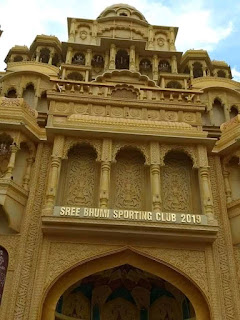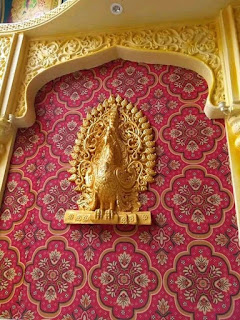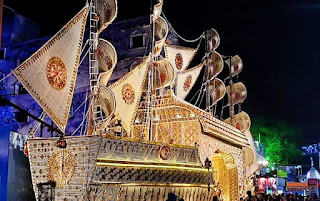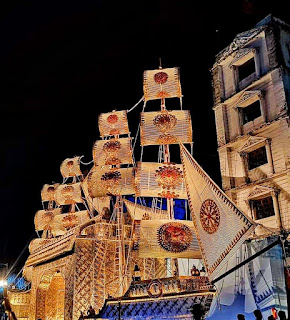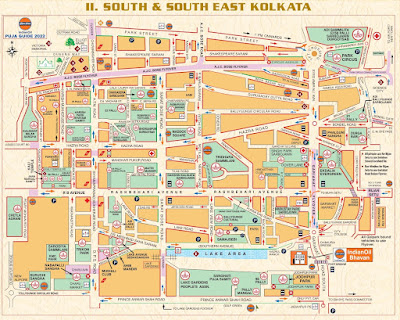Kolkata Durga Puja Road Maps 2023
VISIT OUR WEBSITE FOR LATEST MAP OF 2023
CLICK HERE
Pedestrian Circulation Map |
North and Central Kolkata Map |
Port Area Map ------------------------------------------------------------------------------------------------------------------------- |
South and South East Kolkata Map ------------------------------------------------------------------------------------------------------------------------- |
South Suburban and South West Kolkata Map |
The Rituals of Durga Puja
The
festival of Durga Puja starts with Mahalaya, the first phase of the waxing moon
in Aswin. Thousands offer prayers to their ancestors at the city's river banks,
this ritual is called Tarpan. The inauguration of the Goddess idol starts on
Mahashasthi. The main puja is for three days - Mahasaptami, Mahaastami,
Mahanavami. The puja rituals are long and very detailed and complicated. Three
days of Mantras and Shlokas and Aarati and offerings - needs an expert priest
to do the Puja. Because of these facts, the number of Pujas held in the family
has reduced and Durga Puja has mostly emerged as a community festival.
Mahashashthi
On
this day Goddess Durga arrives to the mortal world from her heavenly abode,
accompanied by her children. She is welcomed with much fanfare amidst the beats
of dhak. Unveiling the face of the idol is the main ritual on this day.
Kalaparambho, the ritual performed before the commencement of the puja precedes
Bodhon, Amontron and Adibas.
Mahasaptami
Saptami
is the first day of Durga puja. Kolabou or Nabapatrika is given a pre-dawn
bath. This is an ancient ritual of worshiping nine types of plants.
The nine plants comprising Nabapatrika are:
Banana plant "Kola
Gaach"
Turmeric plant " Halud Gaach"
Jayanti
tree
Wood apple tree " Bel Ghaach"
Pomegranate
tree " Daalim Gaach"
Arum plant "Maankochu"
Rice
plant
Ashoka tree
The nine plants of Nabapatrika represent the nine Goddesses.
The Banana plant or the "Kola Gaach" represents Goddess Brahmani,
Colacassia plant represents Goddess Kalika, Turmeric plant symbolises Devi
Durga, Jayanti denotes Kartiki, Bel or wood apple Goddess Shiva, Pomegranate
(Dalim Gaach) Raktadantika, Ashoka tree symbolises Sokrahita and Arum plant
("Maankochu") represents Chamunda and the Rice plant Goddess
Lakshmi. These Goddesses are the nine forms of Devi Durga.
Bathing Ritual of
Mahasaptami:
In
the early hours of Saptami, the twigs of white "aparajita"
plant along with nine bunches of yellow threads are used to tie the
Nabapatrika. It is then bathed. In our scriptures the elaborate bathing ritual
of nabapatrika is compared with the coronation of a King. Just like the King is
bathed with waters from holy places and oceans, bathing nabapatrika too
requires the same. All the nine Goddesses representing nabapatrika are bathed
with waters from 8 different holy places. This bathing ritual is accompanied
with varied mantras and diverse musical instruments for different goddesses. (*bathing
rituals). The main Saptami Puja follows Kalparambho and Mahasnan.
Mahaastami
The
day begins with a recital of Sanskrit Hymns in community Puja Pandals as
thousands of devotees offers Puspanjali to the Goddess. Kumari Puja or the
worship of little girls as the mother goddess is a special part of the rituals
performed in a number of traditional and household pujas. As the day passed on,
it was time for the important Sandhi Puja, which marks the inter-link of the Maha
Ashtami and Maha Navami.
Sandhipuja
: An integral and important part of Durga
Puja, Sandhi Puja is performed at the juncture of the 8th and 9th lunar day.
Sandhi puja lasts from the last 24 minutes of Ashtami till the first 24 minutes
of Nabami. During this juncture (the "Sandhikhan"), Durga is
worshipped in her Chamunda form. Devi Durga killed, Chando and Mundo, at the
juncture of the 8th and 9th lunar day, known as "Sandhikhan" and thus
acquired the name of "Chamunda".
Mahanavami
This
is the concluding day of Durga Puja. The main Navami puja begins after the end
of Sandhi Puja. The Navami Bhog is offered to the goddess. This is later
partaken as prasad by the devotees.
Dashami
Dashami
After
the three days of Puja, in Dashami , in the last day, a tearful farewell is
offered to the Goddess. Most of the community pujas postpone the farewell as
long as possible and arrange a grand send-off. The images are carried in
processions around the locality and finally is immersed in a nearby river or
lake. Vijaya Dashami is an event celebrated all over the country.
Sindur Khela (Vermillion game)-
Durga Puja Fast
Rituals
The custom of observing Durga Puja Fast is particularly prevalent in Northern India. In the state of Punjab people observe fast for seven days of the nine-day-long Durga Puja Festival. The fast is broken only on the ashtami or navmi day. Some devotees of Durga Ma consume only milk during the fasting days while some only live on fruits. Some devotees observe ‘Ekana’ which means that they take one complete meal during the day. Non-vegetarian food, intoxicating substances and other forms of entertainment are completely avoided during the fasting days. Men observing fast are not supposed to shave. Some also believe in sleeping on the ground and thereby deny themselves all luxuries and comforts. Fasting during Durga Puja festival is also quite popular in the state of West Bengal and several other Southern states. At the end of the fasting period devotees feed beggars and worship little girls who spell the Shakti of Mother Goddess. At several places there is a tradition of sowing barley seeds during the Durga Puja fasting period. In this a small bed of mud is prepared in a little container and barley seeds are sown in it. This is placed in the Puja room and cared for during the fasting period. At the end of the fast the shoots reach a height of 3-5 inches. These are pulled out and given to devotees as form of blessings.





















